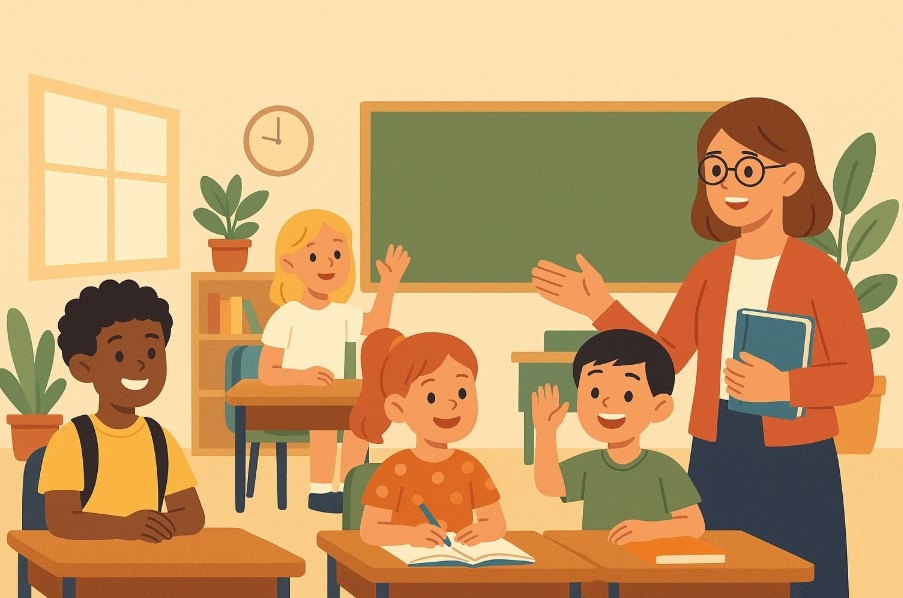
Ask any teacher why they took up the job and rarely will you hear them mention remuneration, extra holidays or recognition. Indeed, the altruistic desire to see a young person succeed and go on to become a happy and well-adjusted adult is what keeps most teachers going – even as the massive pressures of the job take their toll.
Perhaps the most complex pressure that teachers deal with is the youth mental health crisis.
According to an April 2025 survey by the University of Adelaide, nearly one third of secondary students and more than one quarter of primary students experienced high levels of depression or anxiety symptoms in 2024 alone. Worryingly, many more students reported moderate levels of mental distress, raising concerns about their vulnerability to additional stressors.
At Loganlea State High School, south of Brisbane, staff go above and beyond to make sure that every aspect of the student experience is not only enjoyable but makes them feel seen and heard.
A sense of belonging at the core
The school’s approach recognises a growing body of research showing that students with a strong sense of belonging are “happier, have better self-esteem, cope better with challenges and report a lower level of bullying”. Belonging is also one of the strongest predictors of attendance for Year 7 and students from low-SES backgrounds.
By 7:30am, Loganlea students and staff line up at the “breaky club” for free toast, cereal and milk – an early ritual emblematic of a school where student wellbeing is interwoven into the tapestry of everyday life. But free breakfast is just a single ingredient in Loganlea’s comprehensive wellbeing program.
On campus, a dedicated Wellbeing Hub offers a one-stop shop of support – from youth workers and guidance officers to a nurse, psychologist, chaplain, and even a visiting GP. Guided by core values of Respect, Integrity and Resilience, Loganlea’s holistic approach goes above and beyond what most schools offer. And it appears to be paying off: while many Australian schools are doubling down on their wellbeing initiatives, Loganlea has seen standout results – including improved attendance and half as many students leaving without a post-school plan.
At the Australian Education Awards 2025 on Friday 8 August, Loganlea State High School’s inspirational work was celebrated and recognised on the national stage when it won the Parentshop Best Student Wellbeing Program.
In an interview with The Educator at the event, Hayley Cravigan, General Manager of Parentshop, said the company sponsored the award because wellbeing sits at the heart of what Parentshop does.
“It’s personally very important to us,” Cravigan told The Educator.
“We run wellbeing programs, and we’re so inspired by the educators that lead those programs in schools, the innovations they come up with, and the dedication they have to go above and beyond just teaching and do the foundational skills for life learning, which is looking after student wellbeing.”
Keeping it real
Kevin Roy, Dean of Year 10 at Loganlea State High School, said the school’s holistic approach to student development is driven by a deep commitment to personalisation and real-world readiness.
“Loganlea State High School aligns all aspects of school life with our core values of respect, integrity, and resilience to develop future global citizens,” Roy told The Educator.
“We make a significant investment in understanding the needs of each individual, as well as the diversity of our student body, to create weekly structured lessons tailored to each year level.”
Roy said the inclusion of guest speakers and community partners ensures students are regularly exposed to real-world learning experiences.
“Early intervention in career planning enables students to explore their options, gain essential knowledge, and be well-prepared for life after school.”
Small school, big heart
Roy said being a smaller school allows staff to be more actively involved in the individual success of each student.
“School leaders invest time in building strong relationships with students by being visible in classrooms and during breaks,” he said. “Understanding our students’ needs—and actively listening to their voices—drives our annual improvement agendas and well-being programs.”
Roy said student-led projects, such as the newly developed welcome pathway at the school entrance, reflect the school’s diverse community.
“This initiative brings together the many cultures of our school by greeting visitors in over sixty different languages.”
Not content to rest on its laurels after winning the Parentshop Best Student Wellbeing Program, the school’s well-being program will be continually evolving to meet the needs of its students.
“One exciting new initiative is the launch of Care Class Mini Projects, where each Care Class is challenged to develop a practical solution to a real issue within our school community,” Roy said.
“Through the project, students will identify a problem faced by Loganlea, investigate the issue and propose a viable solution, develop a pitch and supporting communication/demo materials, and present their pitch to a panel for feedback.”
Roy said students can choose to focus their projects on sustainability, resourcing, student wellbeing, or connection to Community.
“This initiative empowers students to take ownership of their school environment, develop critical thinking and teamwork skills, and make meaningful contributions to school improvement.”

